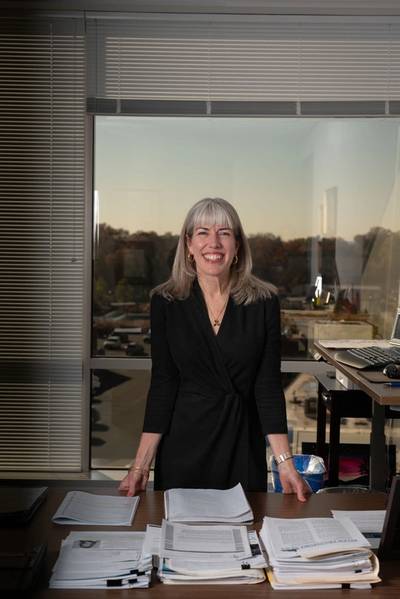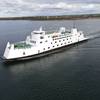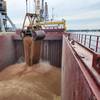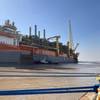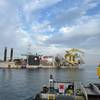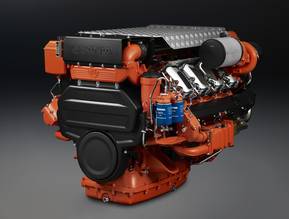Insights: Jennifer Carpenter, President & CEO, American Waterways Operators
Jennifer Carpenter joined The American Waterways Operators (AWO), the national trade association representing the inland and coastal tugboat, towboat and barge industry, in August 1990 and became its president and CEO in January 2020. She highlights some of the greatest focus areas for the 80-year-old trade group—simultaneously looking at both the present day and the road ahead.
The towboat, tug and barge industry is in a period of rapid evolution. How is AWO—now in its 80th year of existence—adapting to meet the industry’s evolving needs?
It starts with listening to members so that we can adapt to the changing needs that they have now, and the needs that they anticipate having going forward. Some things stay pretty constant: AWO's fundamental roles as the industry's advocate, as a resource for the industry, as the industry's united voice. But what are the issues? What are the challenges? What are the things that could really shape members, both in the public policy environment and the business environment, over the next few years? Those things change. In order to evolve and adapt, we've got to be constantly talking with members, listening to them, hearing what they have to say so that we can make the improvements, make the changes and make sure that we're keeping up.
CARB’s harbor craft rules have been center stage of late. AWO’s stance on the situation has been clear since day one. What do you make of recent developments?
I think that concerns about both the safety implications and the supply chain implications of the CARB harbor craft rules are gaining traction. To be clear, our industry does not shy away from making improvements, making upgrades to support safety and environmental sustainability. You've seen that many times over the years in our support for things, our leadership of things like Subchapter M, or the Vessel Incidental Discharge Act. Unfortunately, CARB has, to date, just not been willing to make changes to make sure that their regulations are going to be effective in reducing emissions, and they're not going to produce unacceptable safety risks for mariners and vessels and the environment and that they're going to be achievable within the prescribed timeframes.
What we’re seeing now is it's not only AWO, vessel owners and maritime labor who are saying this; it's the Coast Guard saying, "We've been telling you this, CARB. We continue to have concerns that you haven't addressed." And I think the increasing media coverage that we're seeing and the introduction of legislation in the California assembly is reflective of the fact that there are serious unresolved concerns. The fact that EPA has had California's request for a waiver to allow it to enforce these regulations on its desk for quite a while and hasn't approved it, I think, can be read as EPA has serious questions and concerns.
I hope that Governor Newsom will take note of this and will recognize that there is a path forward here, but it does require engaging with industry, engaging with the Coast Guard and making some revisions so we have a rule that's going to be both effective and safe.
Increasingly, cyber security has been gaining focus as an area of concern across maritime supply chains, and recently the Coast Guard has been tasked with creating and enforcing maritime cyber standards. What do you hope to see from these standards as they are drafted and put to use?
Two key watchwords here are going to be risk-based and scalable. Everybody needs to have good cyber hygiene—any business, anybody who uses a computer, anybody who has electronically controlled and connected systems. It's really important for safety, for security, for the bottom line as everybody knows. Good cybersecurity practices, cyber-risk management practices absolutely should be part of a company's safety management system. We're doing a deeper dive into the Coast Guard's proposed rule. What we hope to see and what we'll really be advocating for is an approach that is risk-based, recognizes that not every company's or vessel's risk profile is the same and that recognizes that company size and sophistication also varies. So, what does a cyber-risk management program look like if I'm operating two harbor tugs in Evansville, Ind., versus if I am operating six terminals at the port of New York and New Jersey? We should both have good cyber, no question, but what that looks like is and should be a little bit different based on size, scale and risk.
AWO has been actively involved in helping the industry address workforce issues, which continue to be a major challenge for many companies. Will you please discuss these efforts and their impacts?
At AWO, our first mission is to be an advocate for the industry. We want to make sure that government agencies are not making a challenge worse by what they do or fail to do. We work very hard with the Coast Guard to make sure that their National Maritime Center has efficient processes for reviewing and approving merchant mariner credentials. We want to make sure that we don't ever have mariners who are frustrated and consider leaving the industry because it's just too hard to get and maintain the credentials that they need for their livelihood. We want to make sure we never have companies, vessel owners who say, "I have a boat that needs to sail, and I have someone who can't get their license renewed because the NMC is using late-20th century technology in 2024." That's an area of focus.
We also want to make sure that we have workers on our vessels who are fit for duty. One of the things that we have been advocating for in this era when we've seen cannabis legalization in a number of states and localities is drug testing options which are better gauges of impairment than the current testing modalities that have been approved. We are strongly supporting the Department of Transportation's decision to allow oral fluid testing as a drug testing alternative. This gives you maybe a couple day lookback window instead of a month or more so company could more readily tell, "Hey, do I have somebody who's a safety risk here, or do I have somebody who had a marijuana gummy before he ever considered applying for a job in this industry?" The Department of Transportation has approved oral fluid testing for the other modes of transportation that it regulates. We now need the Coast Guard to publish a parallel regulation to authorize it for marine use as well. We're pressing for the Coast Guard to do that with speed.
In addition, we want to be a resource for our members and develop tools and provide forums that they can use as they deal with the challenges of recruiting and retaining and growing their maritime workforces. We've put on a series of virtual mariner workforce forums. We have engaged with our members and maritime schools and academies to talk about how their offerings could be tailored to better support our industry.
As we try to serve as the industry's united voice, we are partnering with other organizations to spread the good word about the awesome careers that are out there in our industry. We want to do that in a realistic way. These are great careers where a hardworking person can make a six-figure income within a matter of seven years and have a fantastic career with lots of responsibilities and great benefits. It's hard work. You're deployed. You're on the water. You're away from home. It's 24/7. We want to be realistic about the challenges involved as well as forthright in describing all the benefits so that folks know that the industry is out there and can make a decision about whether it's right for them. I think we still have the strong sense, as do a lot of our public and private sector partners out there, that there are a lot of folks in this country who just don't know what opportunities are available to them here and would be pretty excited if they knew what those opportunities were.
Last year the USCG updated its guidance for ATBs. Why were these updates necessary and what are the biggest changes?
The Coast Guard really needed to update its ATB guidance. Their Navigation and Vessel Inspection Circular had last been revised in 1981. In 40-plus years, the ATB fleet has grown significantly. In addition, we're now in the Subchapter M era. Tugs that are part of an ATB combination are inspected. The Towing Safety Advisory Committee had done some good work with the Coast Guard several years back on trying to provide clearer guidance on when ATB barges can be authorized to be conditionally occupied, that is, when somebody can go from the tug onto the barge and work there for a period of time. We needed this new guidance because the old guidance was out of date.
We've still got some work to do. Despite the new guidance, we are seeing differences in the way that the Coast Guard is applying crewing and life-saving requirements to ATBs from one unit to another. Those differences don't seem to be driven primarily by risk, by the specific operational risks involved, but more by ambiguity in the requirements which then leads to different interpretations and different outcomes. We appreciate the Coast Guard taking steps to modernize its policy. We think there's a little bit more work to be done there.
The previous Coast Guard guidance was old, but ATBs are not new. These are vessels that have a really outstanding and long safety record of operation in the US. I think it's really important for the Coast Guard as they modernize their guidance to really take that risk-based lens that we've talked about on cyber and other issues and make sure that it is tailored.
Looking across the industry, what are some other important regulatory issues that AWO is currently paying attention to?
On Subchapter M, believe it or not, we are getting ready for some vessels to embark on the COI renewal cycle, so we want to make sure that that renewal cycle goes smoothly and efficiently, that the process of dry docking and all of that goes efficiently and, again, with a risk-based approach. We got through the initial push to get all of the towing vessels certificated, but we're not done. We need to make sure that as we move into this next stage, whether a company is using the TPO option, the TSMS option or the Coast Guard option, that that policy is being applied, that the regulations are being applied in a practical risk-based way.
We hope to see a Coast Guard Authorization Bill and a Water Resources Development Act enacted this year. There is a need on the regulatory side for some clarification on a couple of issues, including engine room crewing on ATBs with automated systems. This is an issue that Congress thought that it addressed in the last Coast Guard Authorization bill, the last National Defense Authorization Act. Unfortunately, the Coast Guard hasn't implemented it yet. It shouldn't come to this, but Congress may need to tell them again, "We told you to do this. Please, this time, get it done."
The issue of sexual assault and sexual harassment prevention and response is really important for both mariner safety and mariner mental health and well-being. We've got a continuing need to make sure that our members have the resources that they need to build and maintain the kind of workplace cultures that are needed in this industry. We also need to make sure that the Coast Guard is clearly and practically implementing the Safer Seas Act that was enacted at the end of the last Congress. There are several areas with respect to surveillance cameras for larger offshore vessels and master key control systems where existing guidance is not clear at best and is problematic at worst. There's a need for some clarity there.
The last thing I'll say is the Vessel Incidental Discharge Act. EPA is due to finalize its regulations implementing that statute later this year, setting standards for ballast water and other vessel discharges. The Coast Guard will then need to pick up the baton and produce its regulations implementing the EPA standards. That's where they'll deal with things like inspection and record-keeping which have been really significant parts of the burden that companies have incurred under the Vessel General Permit. We would like to see both agencies move forward quickly. They're already really late. They've blown past their statutory deadlines. They need to get those rules published in practical ways so that the intent of Congress in passing that legislation can be realized.
For AWO, as an organization, what is its top priorities for the coming six to 12 months and what's being done to address them?
We've hit on some of them. If I had to take it up to a higher level, I would say really focusing on our relationship with the Coast Guard and making sure not only that we have good communication and consultation, but also that the agency is producing practical risk-based regulations, policies, policy interpretations. That is a high priority, and that touches on a range of issues from Subchapter M to ATBs to SASH, etc. We'd like to see Coast Guard Authorization Bill and a Water Resources Development Act to get enacted that address some key industry priorities that don't include any harmful provisions.
We are always about spreading the word about the importance of the Jones Act and making sure that not only do we have strong bipartisan congressional support, which we do, strong support from the top of the administration, which we do, in President Biden, but also that agencies are faithfully carrying out that direction in their Jones Act enforcement policies.
Last, I'll mention state advocacy. We talked about CARB earlier. That is at the top of the list of regulations that need revisions in order to work from a safety standpoint and from a supply-chain standpoint, but there are others out there, too, we're dealing with.
Is there anything else you’d like to add or that you think Marine News readers should know about?
We're trying to do hard things, and so it's really important that we are a united industry, that we're fielding a full team and that we are pushing hard together to tackle some of these tough issues. We have a long history as an industry of winning on tough issues. Sometimes we win in overtime, sometimes we win in game seven, but it really takes a united industry, and so I just really appreciate the great work of AWO members, of coalition partners, shippers, other associations, WCI, maritime labor who really help us form an effective fighting force.
The other thing I'll say is I think it's really important to always have what I would call a bifocal vision. Obviously, we've got to deal with the issues that are right in front of us now. What do we need to fix today because it's a problem, because it's a challenge, but we've also got to be looking ahead and saying, "Hey, what are the things that we can be doing now to prepare ourselves for the future?" and so a lot of our work on sustainability, on workforce is really aimed at that objective. What do we need to be doing now to make sure that folks understand that tug and barge transportation is the most sustainable mode of freight transportation? How can we make sure that our ports and waterways infrastructure is funded, is operating in a way that optimizes both economic efficiency and also environmental efficiency? What do we need to be doing now to make sure that we're not handicapping or stymieing?
We need to make sure the path is clear for innovators, for first movers who want to adopt new technology and then scale that so the rest of us can learn from it. The ATB crewing issue I mentioned is an example where we’re penalizing companies that have made investments in technology designed to make things safer and more efficient. We’ve got to fix that.



